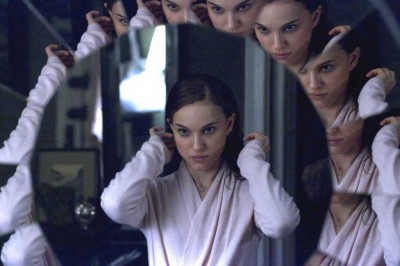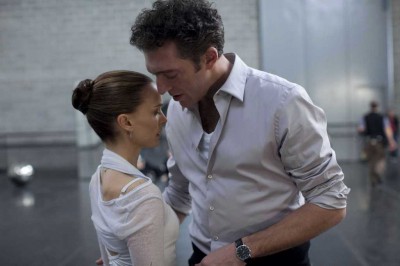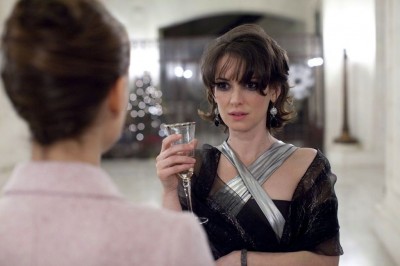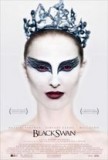| Reviews & Columns |
|
Reviews DVD TV on DVD Blu-ray 4K UHD International DVDs In Theaters Reviews by Studio Video Games Features Collector Series DVDs Easter Egg Database Interviews DVD Talk Radio Feature Articles Columns Anime Talk DVD Savant Horror DVDs The M.O.D. Squad Art House HD Talk Silent DVD
|
DVD Talk Forum |
|
|
| Resources |
|
DVD Price Search Customer Service #'s RCE Info Links |
|
Columns
|
|
|
Black Swan

"Black Swan" is a grotesque psychological horror film that provides pits of madness juxtaposed with the gilded, professional grace of the ballet world. Furthering his study into the resilience of the human body kicked off in the 2008 stunner, "The Wrestler," director Darren Aronofsky rummages around the pockets of Polanski for inspiration, turning a sparse screenplay into an orgy of injury and psychosis. It's a competitive ballet story only for surface purposes, showing more interest in the erosion of reality than the routine of company life.
Raised by her resentful mother (Barbara Hershey) to become a ballet star, Nina (Natalie Portman) has struggled to catch the eye of company director Thomas (Vincent Cassel), unable to soften her rigid technique and infuse her dance with raw passion. Sensing a burgeoning fire within her porcelain shell, Thomas gives the lead in the upcoming production of "Swan Lake" to a startled Nina, who quickly assumes a punishing regiment of rehearsal to make her interpretation of the central role, with its complicated duality, a work of balletic splendor. Interfering in Nina's progress is Lily (Mila Kunis), a newcomer to the company whose vulgar social displays seek to tempt the star into submission. With the pressure and paranoia mounting, Nina is soon plagued by macabre hallucinations of a nightmarish avian transformation, rooted in her past habit of self-mutilation.

If there was anyone born to direct this picture, it's Aronofsky. A frantic gulp of poison, "Black Swan" recalls the filmmaker's agitated early work, returning to the thematically similar realm of his 1998 indie smash, "Pi." Aronofsky has always been capable of staging dire, brain-melting panic, yet "Black Swan" presents an intriguing challenge of regality, as Nina's twitchy desperation for validation is slapped up against the fiercely internalized demands of ballet -- a form of dance that always come across on film as a boot camp for young women hoping to cultivate crippling neuroses and severe body shame issues. It never strictly concerns the business of tutus and pirouettes.
The screenplay (by Mark Heyman, Andres Heinz, and John McLaughlin) is deceptively simple in design. Nina faces the ruthless rituals of professional dance while infantilized by her overbearing mother. She has an eating disorder (which her mother practically mocks with a purchase of a decadent celebratory cake), a history of "scratching," and she's observed the harrowing downfall of her predecessor, former star ballerina, Beth (Winona Ryder). To achieve the primal despair of "Swan Lake," the dancer must confront herself in ways she's never experienced before, while avoiding Thomas's sleazy sexual advances (a Cassel specialty) and studying Lily's suspected plan of drug-fueled betrayal. The tempest of anxiety surrounding Nina is real, it's happening, and to a young woman who's never had the opportunity to mature.

When that pressure manifests itself in visions of peeling skin and monstrous metamorphosis, "Black Swan" slides more comfortably into Aronofsky's wheelhouse, handing the director ample opportunity to visually inspect the reverberating mental breakdown that may or may not reflect Nina's reality. Supported by a ferociously manic piece of acting from a feral Portman, the film morphs into a twisted vision of hysteria, with Nina experiencing flashes of her dominating black swan double, urging her to explore her sexuality and smirking confidence, effectively eradicating the virginal white swan side she's accustomed to. Basically, it's "Cutting: The Movie," with a Cronenbergian arrangement of festering wounds employed to reinforce to the seismic changes churning within the character as she reaches for the ultimate stage interpretation.
Merging Tchaikovsky's musical waves with Nina's bloody backstage rebirth in a knockout orchestration of parallel implosion, "Black Swan" hits a soaring operatic high for the closing number. The sexual displays sometimes slip into aggressive exaggeration, a few beats of insanity are more ridiculous than shocking, and a handful of forays into high camp are barely tolerated. However, once Aronofsky mounts a sneak attack of symphonic deliverance, merging Nina's worst fears with her spotlight euphoria, "Black Swan" achieves an immortal posture of wildly interpretive delirium that burns splendidly.
|
| Popular Reviews |
| Sponsored Links |
|
|
| Sponsored Links |
|
|
| Release List | Reviews | Shop | Newsletter | Forum | DVD Giveaways | Blu-Ray | Advertise |
|
Copyright 2024 DVDTalk.com All Rights Reserved. Legal Info, Privacy Policy, Terms of Use,
Manage Preferences,
Your Privacy Choices | |||||||










